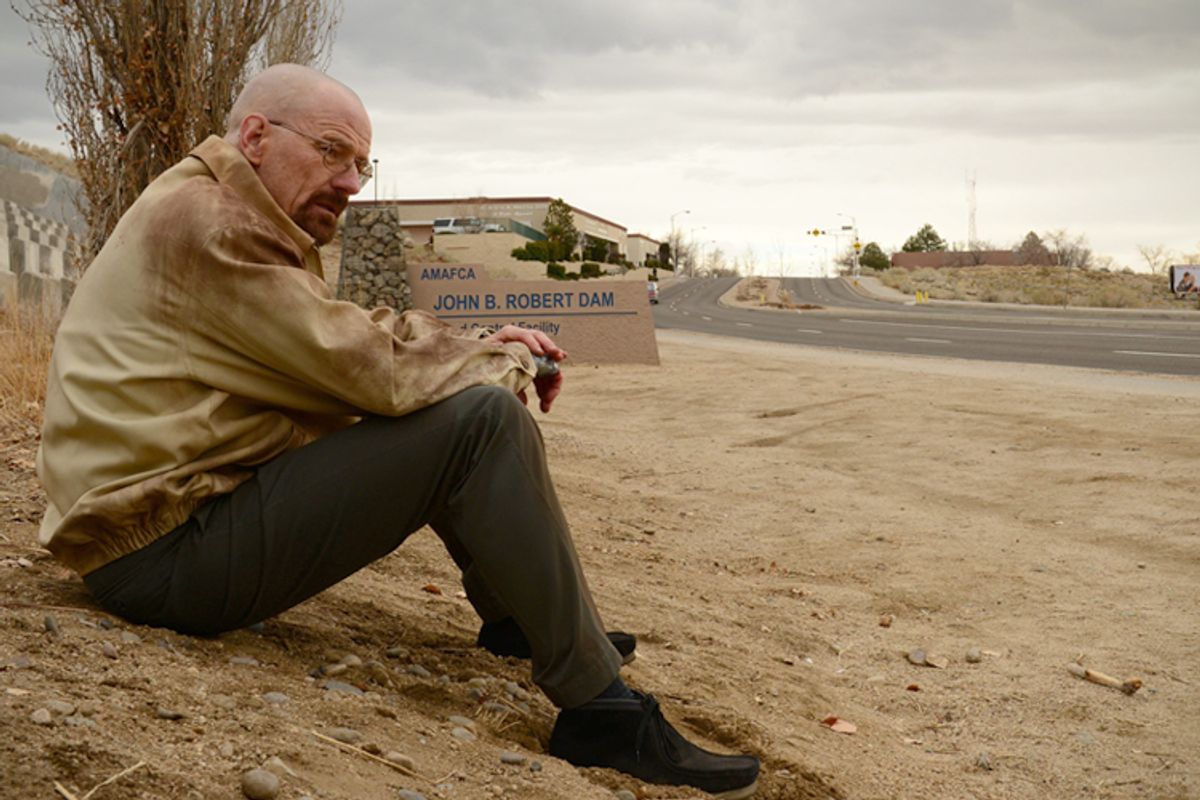By now, it seems obvious that the final episode of "Breaking Bad," which aired last night, enjoyed near-universal (if sometimes measured) acclaim.
And though we'd all be well-served, perhaps, by re-evaluating the finale once the fervor has died down (so, in a couple of years?), early impressions of finales tend to stick. "The Sopranos," whose finale is to my own personal taste, stumped in 2007 and still prompts debate; the last "Six Feet Under" was hailed in 2005 despite a rocky final run of episodes and still comes up in best-finale conversations.
"Breaking Bad" meted out, in its final minutes, punishment and reward to the respectively deserving. But for a dark drama, it was remarkably conclusive, resembling less the open-ended (but great) final moments of "The Sopranos" and "The Shield" than the last moments of a sitcom. When done well, leaving loose threads dangling can be marvelously satisfying; this is not the route the "Breaking Bad" team took, so much so that at Vulture, Matt Zoller Seitz compared the finale to that of "Cheers." To me it chimed more with (admittedly, a hobbyhorse of mine) the "Sex and the City" finale.
On that comedy's final moments, the protagonist declares that her quest for love -- the very point of the show -- hasn't really been as important as her own personal development. "But the most exciting, challenging, and significant relationship of all is the one you have with yourself," Carrie intones in voice-over. If "Breaking Bad" had a voice-over effect, Walt might have used different words to convey the same effect; that everything that's come before can be re-evaluated through the lens of the central character's narcissism, and that the protagonist's personal development has been the really important element of the show. Indeed, Walt's admission to Skyler during their final meeting that he'd truly loved manufacturing and dealing meth -- that he'd done it, more and more, for himself and not for the family -- serves that purpose. Finally, we're able to see Walt for what he really is, fannish love for his bravery or self-sacrifice or toughness or whatever it is his admirers like about him aside. He tells us so himself! He's a person whose actions were undertaken out of sheer joie de vivre, who explained it to himself as a sort of family obligation. This sort of direct, plainspoken conclusiveness is unusual for the modern drama.
Conclusiveness does not necessarily mean the sort of hairpin turn that many finales take -- as in the case of "St. Elsewhere," where it's revealed the entire show was made up by an autistic child, or "House," where House fakes his own death and drives off on a motorcycle. It's possible to end a show in a decisive manner without resorting to an eleventh-hour twist, but everything that comes before has to have been unified enough to have built to a conclusion. Without a properly built show, any ending will seem out of left field.
The recent high-art cable boom hasn't had much room for tidiness; the finale of "The Shield" leaves entirely open what its protagonist is going to do with that gun. "Six Feet Under," for as fantastic as its series-ending montage of every character's death is, leaves open the question of whether their lives were well-lived. "Breaking Bad," in its last episode, was so neat as to almost seem didactic in comparison to other recent finales of its ilk. If it seems "too neat," that's because other great endings are so very messy; perhaps that's what viewers needed, though, to metabolize the somehow-even-worse-than-Tony-Soprano misdeeds of Walter White. An inconclusive ending would have been unsatisfying here even as it satisfies elsewhere. There was catharsis in the death of Walter and of Todd et al., in the freeing of Jesse, and in Walter's plainspoken conversation with Skyler.
It seems likely that this will enter the best-finale conversation, if only for its novelty. Lesser series tend to ape better ones, and so it is that the inconclusive finale has come to be in vogue for shows that don't know what they're doing. Tony Soprano's cut to black begat Dexter sudden flash-forward to life as a lumberjack, his future unclear; "Dexter" was one of those shows not nearly well-constructed enough to support an ending that wasn't at once entirely random and still, somehow, inconclusive. "Breaking Bad" had the courage to be satisfying in a TV climate that has for a few years treated obliqueness as art itself.

Shares